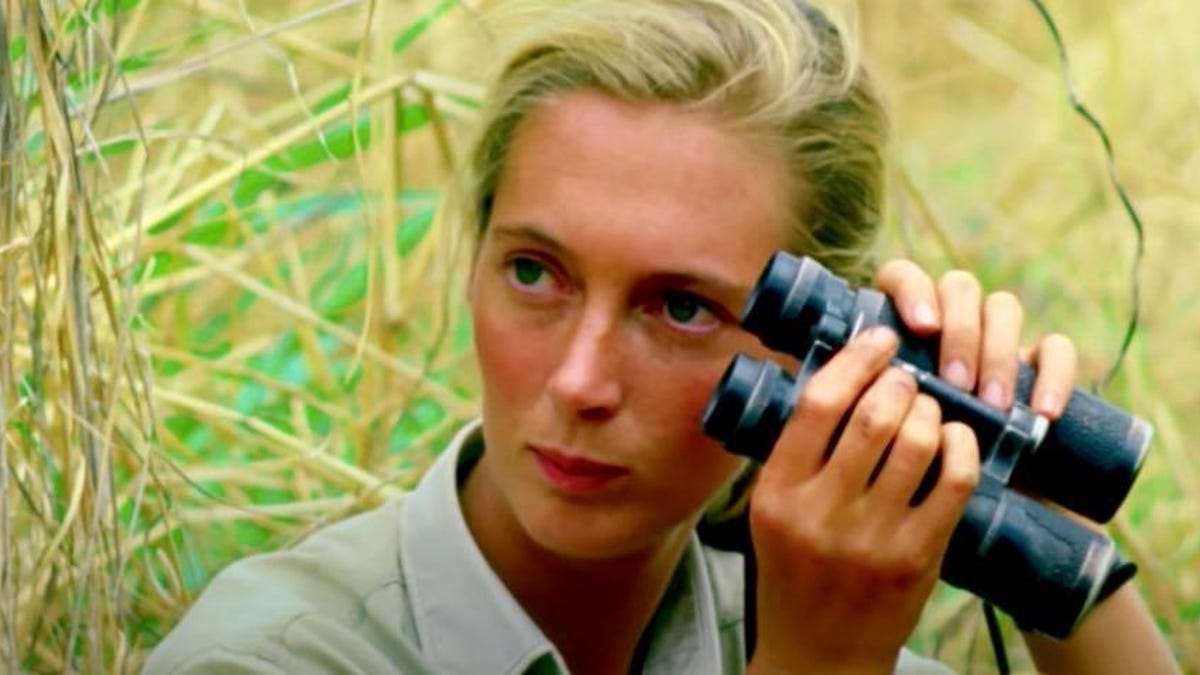 Why You Can Trust CNET
Why You Can Trust CNET Jane Goodall: 'Without hope there's no point in continuing on'
The famed primatologist, subject of a new National Geographic documentary, also talks about the connection between coronavirus and humans' disregard for nature.

Jane Goodall is known for her work with primates, but she's also an avid animal rights and environmental activist.
Jane Goodall has a lot to say about how human disregard for animals and the environment brought on the coronavirus pandemic. But the famed British primatologist believes there's still a chance we can repair our relationship with the natural world, a point she stresses in the new National Geographic documentary Jane Goodall: The Hope. Aptly enough, it premiered on Earth Day.
Goodall, now 86, is best known for her groundbreaking work with primates, including a 60-year study of social interactions among wild chimpanzees at Gombe Stream National Park in Tanzania. She showed that chimpanzees displayed individual personalities, affectionate family bonds and other "human-like" traits.
In addition to Goodall's work with primates, she's an avid environmental and animal rights activist.
I chatted with Goodall by phone about her thoughts on the coronavirus pandemic, animal rights, the environment, activism and the two-hour documentary that captures her determination to spread a message of hope and mobilize a new generation of activists. Here's a lightly edited transcript of our conversation.
Q. Why do you think our mistreatment of animals and the environment paved the way for COVID-19?
It's because we disregard our place in the natural world and we disrespect the environment and animals that COVID-19 happened. Viruses can jump from animals to humans. Viruses can spill over onto humans in situations like our intensive farming with animals, and also in the meat markets in Asia and Africa. It's because of our lack of respect for the environment that this terrible COVID-19 virus has shut down the world.
If we don't learn from this lesson that we should show more respect and we should try to protect the natural world, there will be another pandemic. This one was predicted ages ago in a book called Spillover: Animal Infections and the Next Human Pandemic by David Quammen, but no one paid any attention. This time I hope we will.
Goodall observing chimpanzee behavior at Gombe National Park in Tanzania.
What can humans learn from animals still?
One lesson I've learned is how arrogant we've been to assume that we are so superior to all the other animals. It's led to horrible cruelty. We see the real need for respect for animals knowing now how incredibly intelligent they are, and that they can feel emotions like happiness, fear and grief -- and not just in primates. We find it in elephants and rats. There's a new study showing that a rat will go without food to give it to another companion rat if they smell hunger.
What advice do you give young people who want to fight for a better world for humans and animals alike?
If you really want to do something like this you have to work really hard and take advantage of every opportunity. If you don't give up, you will find a way. I also help young activists with my group called Jane Goodall's Roots and Shoots program, where they can choose projects that help the environment and animals. It began with 12 high school students in Tanzania in 1991, and it's now in 65 countries.
I learned about the interconnection between everything when I was out in the rainforest -- how each little species plays a part. Today all our problems are interconnected. One problem can create another. It's important that our young people learn this.
How did your new National Geographic documentary Jane Goodall: The Hope come about?
National Geographic approached me to make this documentary, which continues on from my previous documentary called Jane. It goes into more detail about what I'm doing now. It's quite extraordinary that a documentary called The Hope should be coming out at this time. We desperately need hope now.
Goodall chats with a young fan during one of her signings.
What do you hope people take away from the documentary?
I hope people watching the documentary realize they can make a difference. With the climate crisis looming over us, we need to take action soon. It's fascinating with the lockdown everywhere that skies that have been polluted for so long became clear and blue again. It's helping some people who have never seen that before be encouraged to demand that their governments put more restrictions on the use of fossil fuels.
I hope people take away the fact that it is possible to have a different sort of life. But it will be too late unless we all get together and take action now to persuade big business and politicians to do the right thing by the future.
Why is keeping hope alive so important, especially now?
Without hope there's no point in continuing on. If the nurses didn't hope they could save COVID-19 patients, they wouldn't be risking their lives. If we don't have hope that our actions can make a better world, then we'd all fall into this apathy. Many people feel helpless right now, but they must stay hopeful that they can influence one another through compassion and understanding.

